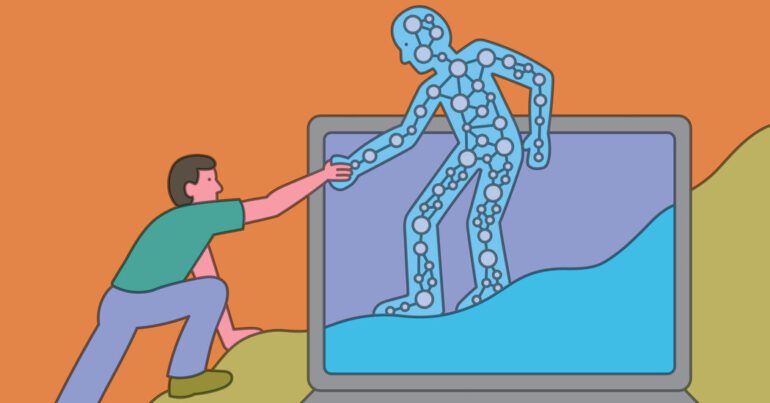TL;DR:
- Google is testing an AI assistant for personalized life advice, posing a challenge to traditional therapists and life coaches.
- DeepMind and Scale AI collaborate to evaluate the AI chatbot’s capabilities with over 100 experts across various fields.
- The AI provides tailored advice on complex life situations and offers assistance in 21 different life skills.
- Concerns arise about over-reliance on AI for major decisions, prompting restrictions on medical and financial advice.
- While AI lacks human emotional intuition, it avoids therapist biases and misdiagnoses.
- For marginalized segments, imperfect AI companions offer solace amidst loneliness.
- AI is poised to complement human services, but societal questions about user autonomy and data privacy remain.
- The market shows a growing demand for AI life advice despite limitations.
Main AI News:
The rapid evolution of artificial intelligence has begun to encroach upon roles once exclusively reserved for human professionals. Among the latest vocations facing potential transformation are therapists and life coaches. Google, the tech giant renowned for its groundbreaking innovations, is presently engaged in the testing phase of a revolutionary AI-powered assistant. Engineered to dispense tailored life counsel, this AI assistant spans a wide spectrum of subjects, from navigating career crossroads to navigating the intricacies of interpersonal relationships.
Collaborating in this pioneering venture, Google’s DeepMind has joined forces with Scale AI, a prominent AI training enterprise. Recent disclosures in The New York Times detail the comprehensive assessment this new AI chatbot is undergoing. Over 100 experts, each holding doctoral qualifications across diverse disciplines, have been commissioned to rigorously evaluate the assistant’s capabilities. Their dedicated efforts encompass a meticulous exploration of the AI’s capacity to thoughtfully address profound queries related to real-world challenges faced by individuals.
A notable example spotlights a user’s query concerning the art of gracefully communicating their inability to afford attendance at a close friend’s destination wedding. In response, the AI companion furnishes tailored recommendations, drawing upon its intricate understanding of the intricate interpersonal dynamics at play.
However, the AI’s ambit extends beyond mere advice provision. Google’s innovation is designed to cover 21 distinct life skills, spanning from specialized medical insights to personalized suggestions for hobbies. Remarkably, the tool includes a planner function capable of crafting bespoke financial budgets, offering a comprehensive suite of resources for users.
As with any technological advancement, concerns have surfaced. Google’s in-house AI safety experts have expressed reservations about the potential consequences of heavy reliance on AI for pivotal life decisions. Their apprehensions pivot on the possibility of compromised user well-being and autonomy. In a strategic maneuver, the company’s launch of the AI chatbot Bard featured limitations on its capacity to dispense medical, financial, or legal guidance. Instead, it prioritized extending mental health resources to users.
This meticulous testing regimen is intrinsic to the development of secure and beneficial AI technology, as underscored by a spokesperson from Google DeepMind in communication with The New York Times. It is crucial to note that the isolated testing scenarios do not necessarily mirror the forthcoming product roadmap, thus requiring prudence in drawing conclusions.
While Google treads cautiously, the fervent enthusiasm surrounding the exponential growth of AI capabilities continues to embolden developers. Evidenced by the widespread success of tools like ChatGPT and other natural language processing entities, there is a palpable demand for AI-driven life advice, even as the current iteration of the technology bears certain limitations.
It’s imperative to recognize that AI-powered chatbots may lack the innate human intuition to detect falsehoods or interpret the subtleties of emotional cues, a topic previously explored by Decrypt. Yet, they sidestep potential therapist pitfalls such as inherent biases or misdiagnoses. According to psychotherapist Robi Ludwig, AI can indeed serve specific populations effectively. However, she underscores that AI’s deficiency lies in its inability to reciprocate human emotions and affection, asserting that genuine human connection is predicated on mutual understanding.
For marginalized segments of society grappling with isolation and a dearth of support, an imperfect AI companion offers a more promising alternative than perpetuated loneliness. Nevertheless, this choice itself harbors inherent risks, as evidenced by a reported incident in Belgium’s La Libre that resulted in a human fatality.
As the inexorable march of AI innovation continues, society is confronted with a litany of complex quandaries. Striking a harmonious equilibrium between user agency and well-being stands as a paramount concern. Additionally, the magnitude of personal data amassed by corporate behemoths like Google sparks debates over the trade-off between convenience and potential hazards, all in the backdrop of a world increasingly reliant on readily available AI-driven assistants.
Conclusion:
The advent of Google’s AI-powered life coaching marks a significant shift in the landscape of personal guidance services. As traditional roles face potential transformation, the evolving AI technology presents both opportunities and challenges. While AI’s ability to provide customized advice and support is evident, its limitations in grasping nuanced human emotions necessitate a cautious approach. As the market reflects rising demand for AI-driven assistance, businesses must navigate the delicate balance between innovation and ensuring user well-being, all while addressing the intricate interplay between data privacy, user autonomy, and the promise of readily accessible AI companionship.

